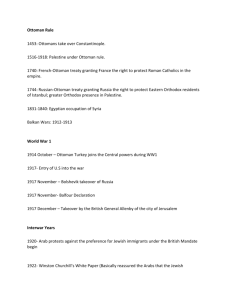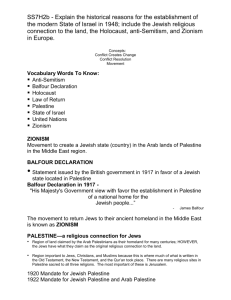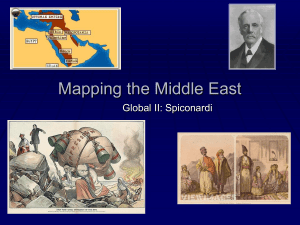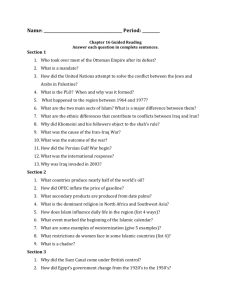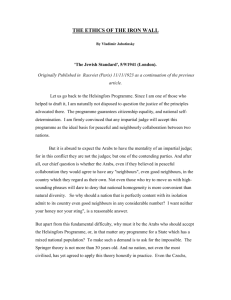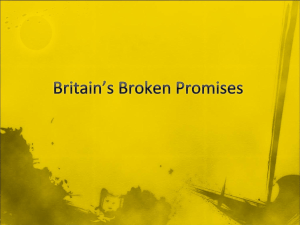Lecture 4 Notes (1/17)
advertisement
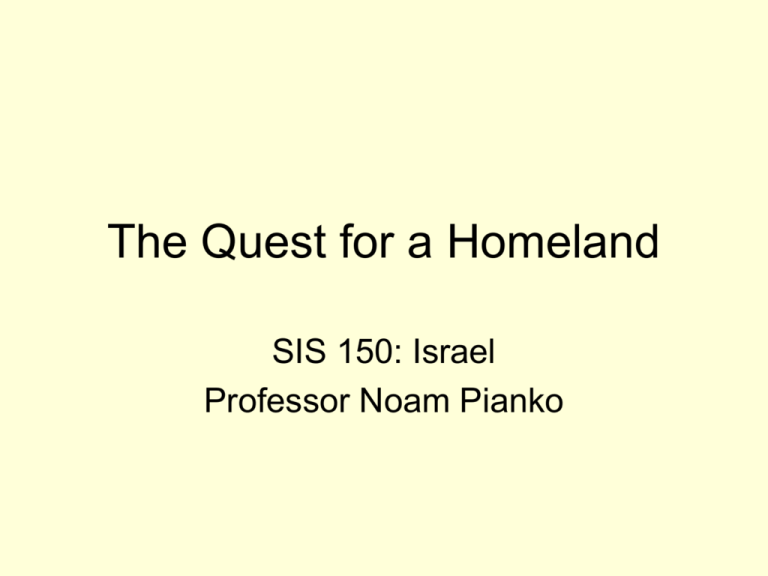
The Quest for a Homeland SIS 150: Israel Professor Noam Pianko Herzl’s Diary, 1897 • “Were I to sum up the Basel congress in a word…it would be this: At Basel I founded the Jewish State…Perhaps in five years, and certainly in 50, everyone will know it.” Lecture Goals 1. Understand Jewish quest for a homeland in larger context of European Imperialism and world history, 1917-1948 2. Compare conflicting Arab and Jewish narratives of this process Dream or Reality? • • • • Funds to Purchase Land Alliance with Great Powers Arab Population What is his strategy? The Ottoman Period (15171917) Jews in the Turkish Empire • Palestine in Province of Syria • Population in 1880: – 470,000 Arabs – 24,000 Jews Jews and Arabs Under Turkish Rule • Arabs – Beduins turned sedentary – Live in Hills, not in coastal areas – Feuding villages, clans – Land owners outside Palestine • Jews – Live in 4 “Holy Cities” – Jews are “dhimini”-Second Class Citizens The Palestinians? • Arab Nationalism begins after Jewish nationalism • Begins as Pan-Islamic Unity against Turkish Empire Neguib Azoury, 1905 • “The reawakening of the Arab nation, and the growing Jewish efforts at rebuilding the ancient monarchy of Israel on a very large scale—these two movements are destined to fight each other continually, until one of the triumphs over the other.” , 1905 Zionism and the Arabs – “A Land without people for a people without a land” (1854 by Lord Shaftesbury.) – “We abroad are used to believing that Eretz Yisrael is now almost totally desolate, a desert that is not sowed.. But in truth this is not the case. Throughout the country it is difficult to find fields that are not sowed. Only sand dunes and stony mountains…are not cultivated.” Ahad Ha-am 1891 Herzl and the Sultan, 1901 • No support for Jewish Homeland • Jewish Immigration Banned The British Empire • 1903 Uganda Offer – Split between territorialist and Zionist – 1905 rejected at Zionist Conference • Why help the Jews? New Imperialism World War I • Central Powers (Germany, AustroHungarian Empire) versus Allies (Britain, France, and Russia) • Arab Lands Central – Suez Canal – Ottoman Empire Hussein-McMahon Correspondence, 1915 What About the French? • Sykes-Picot Agreement in 1915 • “Hunters who divided up the skin of the bear before they had killed it.” Sykes-Picot, 1916 Balfour Declaration, 1917 • “His Majesty’s Government view with favor the establishment in Palestine of a national home for the Jewish people and will use their best endeavors to facilitate the achievement of this object, it being clearly understood that nothing shall be done which may prejudice the civil and religious rights of existing non Jewish communities in Palestine..” Why Promise a Homeland? • Lord Balfour: “The vast majority of Jews in Russia and America, as indeed all over the world, now appear to be favorable to Zionism. If we could make a declaration favorable to such an ideal, we should be able to carry on extremely useful propaganda both in Russia and America.” Philo-Zionism in British Leadership British Victory in Palestine • General Allenby defeats Turkish Forces • Takes Jerusalem in December 1917 Paris Peace Conference, 1917 What did they do? – “These three all-powerful, all-ignorant men [Lloyd George, Clemenceau, and Wilson] [were] sitting there and carving up continents with only a child to lead them.” San Remo Conference and the British Mandate, 1920-22 • Arab-Jewish Conflict in 1920-1921 • Immigration Curtailed • British Appoint High Commissioner, Herbert Samuel 1922, White Paper – “The Balfour declaration…does not contemplate that Palestine as a whole should be converted into a Jewish National Home, but that such a Home should be founded in Palestine” Two Perspectives on Developments Jewish Perspective • 1903-1906 Renewed Pogroms • Chalutzim Mentality • Developments in Europe inlate 20s and 30s increases pressure for safe-haven • Land is purchased • Separate Jewish labor force Arab Perspective • Demographic Growth in Yishuv – 1918 60,000 Jews and 700,000 Arabs – 1922 84,000 Jews and 760,000 Arabs – 1931 175,000 Jews and 880,000 Arabs • Land Purchase and Displacement • Blasphemous for Jews to have political ambition on Muslim land • Concerned about Minority Status 1929 Anti-Jewish Riots • Sparked by Control of Religious Sites • 133 Jews and 116 Arabs Killed (all but 6 by British Police) • British lose control 1929 Hebron Massacre • “On hearing screams in a room I went up a sort of tunnel passage and saw an Arab in the act of cutting off a child’s head with a sword. He had already hit and was having another cut…Behind him was a Jewish woman smothered in blood with a man I recognized as an Arab police constable…He was standing over the woman with a dagger in his hand. He saw me and bolted into a room close by and tried to shut me out—shouting in Arabic, “Your honor, I am a policeman” Response • British: Balfour was a “colossal blunder” • Jews-Haganah and Self-defense • Arab-Pressure British to end Mandate Global Perspective and Palestine • 1933 Nazis in Germany • Rise in Aliyah – 1932-1938- 197,235 European Jews make Aliyah – Equivalent to immigrants from 1882-1932 • Increased Land purchase by Jews • Palestinian Arabs side with Hitler Mufti of Jerusalem • “The Muslims inside and outside Palestine welcome the new regime of Germany and hope for the extension of the fascist antidemocratic, governmental system to other countries.” 1936-1939 Arab Revolt • 1,000 Arabs and 400 Jews die • Killings, Bombings, Armed Attacks • Palestinian Arabs divided Peel Commission, 1937 Response to Peel Commission • Arabs reject plan • Jews accept Peel plan Ben Gurion • “A Jewish state in part of Palestine is not an end, but a beginning..Our possession is important not only for itself…through this we increase out power, and every increase in power facilitates getting hold of the country in its entirety. Establishing a small state …will serve as a very potent lever in our historical efforts to redeem the whole country.” 1939 White Paper • New Policy • Arab demands met – Limit on Jewish immigration – Prohibition of land purchase Zionism and Colonialism • No colonizing state • Limited exploitation of Arab workers • Jewish nationalism is anti-colonial
